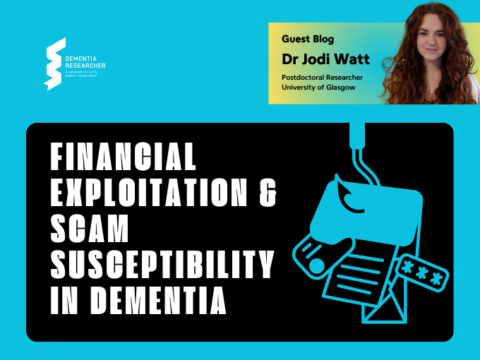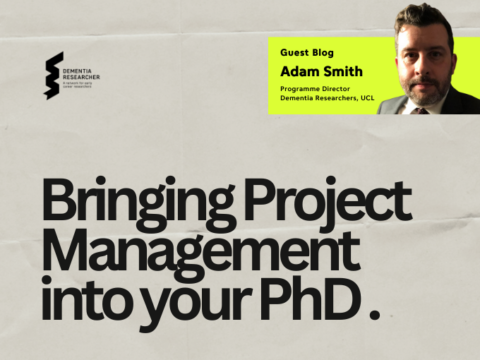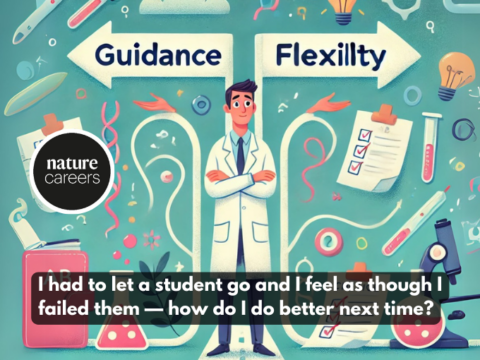We’re scraping the bottom of the barrel here with advice and information I can pass on to you young people in a helpful, and yet not bitter and angry, kind of way. The evil overlord of these articles had suggested this as a title so I opened a page, typed it, looked at it, saved it and then didn’t do anything with it for several months. The only reason I’m attacking it today is because I had a student tell me about a local lab where all the PhD students are ‘dying’ because the supervisor isn’t really present and there are no post-docs and it got me thinking. So today we’re going to talk about how to cope with an absent supervisor, we’ll think about why supervisors might be absent (so that possibly you might have a little sympathy) and we’ll think about what we can do about it.
First off, if you haven’t listened to them go back and listen to the episodes on mentoring and leadership and why having a good mentor and flexible leadership style is important. I’m aiming this at everyone from those about to choose a PhD lab to those about to find somewhere to do their first fellowship. Both of those decisions are important and both of them require good mentorship and a good environment so choose wisely. Because at the end of the day a lot of science is surprisingly interesting and it’s way easier to have a boring project in a nice lab than an amazing project in a horrible lab. Talk to other people in the lab, talk to ex-PhD students, talk to current research fellows and post-docs. I recently had someone approach me about being co-supervised by myself and another researcher and the first thing I did was email a former student who’d had the same pairing and ask if she’d do it again. She said if she’d known more about how to handle things better, she probably would have but not knowing made things more difficult than they needed to be.
This brings us to point one about supervisors. They are busy people. In an academic institution you’re likely to get one of two people as a supervisor. An actual permanently employed academic who has quite a full teaching schedule and is constantly giving lectures and tutorials and having grading meetings. Or a precariously employed academic who may not even have the funding runway to finish supervising you. For those of you reading in the future this is being written a week before the 2024 US election and I heard someone say recently ‘there are no perfect people, so there are no perfect candidates’. It’s the same with supervisors, there are pros and cons to both and we’ll look at them now.
The permanent academic is going to always be there. They’re not going to take a job in Australia next week because it’s better paid and permanent, or leave to go to industry, or just generally run out of funding and become unemployed for six months. They have a set teaching schedule which, if they’re older, has been in place for a while so they know when their ‘busy’ periods are and they know when they’re a little more free for research. This, as you can hopefully already see, means that they may not actually be free for research for large blocks of time. Term time tends to be very busy, exam time especially so. There’s usually a nice wedge of time in the summer when there’s not much teaching going on but at that point if they have a family, they might want to spend a little time with them so might be away more than they were previously. They might also have been doing this for such a long time that they’re a bit removed from the research. Their updates come from the Times science section or Radio 4 and actually they haven’t heard of ATAC-seq and don’t know why or how it would be applicable to anything you’re doing or worse they have heard of it and now want you to use it for everything despite it not being the right tool for the question.
The precarious academic is, as the name suggestions, not necessarily always going to be there. They may take that job in Australia, or leave, or become unemployed through no fault of their own. They are likely to have a very unwieldy schedule, largely dictated by grant deadlines and experiments because chances are they’re trying to write to save themselves from unemployment whilst also doing all the experimental bits and pieces. This means that they are in theory available all the time for science chat and will be deeply engrossed in the subject because they’re often still doing it, but getting hold of them for any length of time, or getting them to focus or care about you in any way, may be a challenge.
So, what can you do about these two different types of academic and is there a better choice? The short answer to that last question is no.
Ideally what you want is someone who has the contract of the permanent academic with the enthusiasm and scientific knowhow and schedule of the precarious one. These people are rare. They do exist, I know a couple but they are rare. But if you’ve got one of the other types then there are things you can and should do.
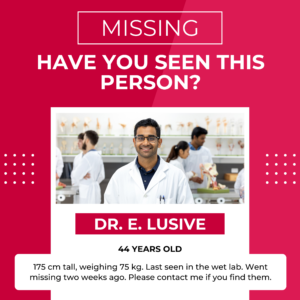
A 2019 Nature survey of 6,300 graduate students worldwide found that 23% were dissatisfied with their supervisory support, citing a lack of time or guidance as key issues.
First, and this applies to both, is manage up. Managing up means engaging your supervisor and asking for their time. The reality of the permanent academic is that they have been at this so long they often see you as free labour. You are all a force who just churn out science they get to stick their name on the end of, and you are not individual people with individual needs. The reality of the precarious academic is that they’re busy trying to save their own job and you are not their priority. Ask for regular meetings with people and if you’re stuck or need something doing ask for help. If you’re not getting help despite asking then you need to look elsewhere. Either for other supervision or other mentorship. Within a lab environment, ideally there are post-docs between you and the PI if you’re a PhD student, but if you’re a fellow you need good mentorship so if you’re not getting it go look for it. I was told as a PhD student I was essentially self-employed and that I needed to be pro-active to get things done. Whilst I agree with this to a certain point there should still be some back and forth between you and the person up top. As a PhD student, or even as a junior research fellow, you absolutely don’t know what you don’t know. This also came up in the mentorship blog. A good supervisor should allow you to grow and be independent, whilst also providing you with a bit of gentle, personalised guidance to stop you veering off the tracks.
Here is where it becomes challenging for supervisors. Actually here is where it becomes challenging for supervisors on precarious contracts. They often don’t have time to actively do this. I fall into this camp and the way I deal with it for the majority of my students is I set expectations early. With my most recent PhD student she got a nice long email when I first became a co-supervisor half way through her project. From a scientific point of view it said ‘I don’t really mind what you do. Here is the overall goal of the project, here is my area of expertise. Come and find me if you need help.’ But more importantly what it also said was ‘I am really busy and might forget you occasionally but that doesn’t mean I don’t care so if you are stuck or lost or sad or whatever, come and find me and I will absolutely make time for you’. The problem with a lot of permanent academics is they stop at the first bit and then don’t say the second bit so when their students or fellows or staff get lost or sad or stuck they absolutely do not know where to go or what to do.
With supervision, and with being supervised, there’s this fine line that needs to be crept along which sits between ‘getting a project done well and neatly’ and ‘learning to do independent science’. As supervisors we could absolutely spoon feed you low-hanging fruit projects where the techniques will be easy and the answers will be quick. It’s what we do for undergrads. But the reality is what would you learn? You would have no resilience to things going wrong, no capacity to problem solve, no ingenuity. And more to the point we would almost certainly have no time because we’d be so busy pointing you at the next experiment every other week. But similarly, piling several unrelated projects on you, pushing you through the lab door, yelling ‘go’ and just leaving you to it for a year is also not appropriate.
With truly poor supervisors you need to find ways to extricate yourself from the situation. If you continue to be supervised by them but are actually getting all your help and day-to-day supervision from the post-doc then that’s bad for two reasons. First, the post-doc probably isn’t getting any credit. But second, if you don’t complain or move then nobody more senior than them will realise they’re doing a poor job and they’ll just get given more students. If you’re actively being bullied and are feeling miserable this is definitely a reason to try and change, but also if you just feel like your supervisor isn’t helping you achieve what you wanted to achieve, that’s also a valid reason to try and change.
Fundamentally what you need to deal with absent supervisors is a bit of self-awareness and self-confidence.
Self-awareness to go on the hunt before you start to find out whether the environment is nice and will suit your own needs for leadership. Self-confidence to stand up for yourself if you feel a bit neglected. Self-awareness to realise that your own supervision needs are likely to change throughout your PhD (usually an inverse bell curve, lots at the beginning and end, less in the middle). Self-confidence to ask for help when you need it most. Because there are no perfect people, absent supervisors are always going to be a problem but by standing up for yourself and your interests you will be able to cope.
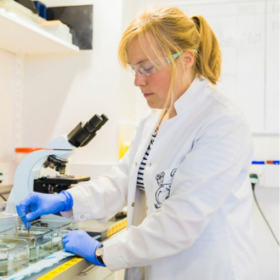
Dr Yvonne Couch
Author
Dr Yvonne Couch is an Alzheimer’s Research UK Fellow at the University of Oxford. Yvonne studies the role of extracellular vesicles and their role in changing the function of the vasculature after stroke, aiming to discover why the prevalence of dementia after stroke is three times higher than the average. It is her passion for problem solving and love of science that drives her, in advancing our knowledge of disease. Yvonne shares her opinions, talks about science and explores different careers topics in her monthly blogs – she does a great job of narrating too.

 Print This Post
Print This Post